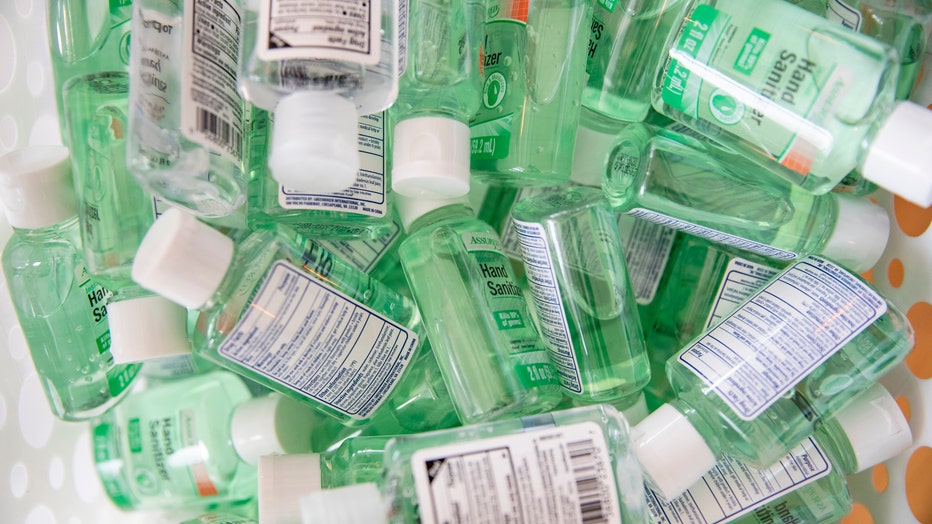Tennessee men caught price-gouging nearly 18,000 bottles of hand sanitizer avoid fines with donation
NASHVILLE, T.N. - Two Tennessee brothers accused of price gouging and hording a stockpile of nearly 18,000 bottles of hand sanitizer amid supply shortages during the COVID-19 pandemic avoided criminal punishment after reaching a settlement with the state attorney general’s office Tuesday.
RELATED: CoronavirusNOW.com, FOX launches national hub for COVID-19 news and updates
Matt and Noah Colvin were able to avoid fines after agreeing to donate their supplies to a Tennessee non-profit and refrain from future hoarding and price gouging activities.
“Disrupting necessary supplies during an unprecedented pandemic is a serious offense,” said Tennessee Attorney General Herbert H. Slatery III. “It became clear during our investigation that the Colvins realized this, and their prompt cooperation and donation led to an outcome that actually benefited some consumers.”
RELATED: Can’t find hand sanitizer? The World Health Organization has a recipe to make your own
The story of the two was first reported by the New York Times when they had allegedly cleared out hand sanitizer from stores around Chattanooga with the intent to sell the items on Amazon.
They allegedly sold the sanitizer for up to $70 a bottle, but declined to disclose their exact profits.
Matt Colvin defended the actions in a later interview with the Times, saying he didn’t realize how bad the shortages would be.

FILE - A basket of smaller bottles of hand sanitizer in the coronavirus pop-up store by Adilisha Patrom, owner of the Suites DC, a co-working and event space across the street from Gallaudet University, who started her pop-up store that sells face ma (Photo by Samuel Corum/Getty Images))
“When we did this trip, I had no idea that these stores wouldn’t be able to get replenished,” he said. “It was never my intention to keep necessary medical supplies out of the hands of people who needed them.”
RELATED: Desperate hunt for medical gear to fight COVID-19 becomes all-consuming
After online retailers like Amazon shut down sellers like the Colvin brothers for price gouging, they were left with their surplus sitting in their garage with no place to sell it.
Amazon said it removed over 500,000 product listings last month over price-related violations directly related to the outbreak.
In March, President Donald Trump signed an executive order making it illegal to excessively stockpile personal protective equipment that remains in high demand following waves of panic buying amid the news of mass shutdowns to stop the spread of the coronavirus.
RELATED: How to make your own face mask at home — even if you don’t know how to sew
U.S. Attorney General William Barr has previously stated that the Justice Department has launched multiple investigations into people hoarding supplies and price gouging.
He said investigators will go after people who are “hoarding these goods on an industrial scale for the purpose of manipulating the market.”
The executive order allows the president to designate some items as “scarce.”
Barr said, "If you are sitting on a warehouse with surgical masks, you will be hearing a knock on your door.”
Federal prosecutors charged a New York retailer Friday with hoarding tons of disposable masks, surgical gowns and hand sanitizer in a Long Island warehouse and selling the items at huge markups.
Amardeep “Bobby” Singh, 45, was charged with violating the Defense Production Act of 1950 in what authorities described as the first such prosecution during the novel coronavirus pandemic.
Singh is expected to surrender to authorities next week in the case around what is known as personal protective equipment, which has become a hot commodity during the outbreak.
Singh’s attorney, Bradley Gerstman, called the charges “mostly fiction” and said the complaint misstated his client’s costs.
In late March and early April, authorities said, Singh stockpiled more than 1.6 tons of disposable masks; 2.2 tons of surgical gowns; 1.8 tons of hand sanitizer and seven shipments of digital thermometers.
The Associated Press contributed to this report.

